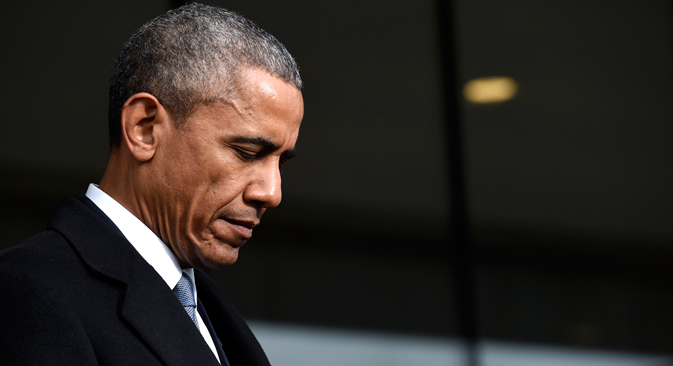
President Barack Obama. Source: AP
The Nezavisimaya Gazeta newspaper writes that the main impediment to signing the Trans-Pacific Partnership agreement, which would create a free trade zone in the Asian Pacific region between 12 countries, is the U.S. Congress. The newspaper says that members from President Barack Obama's own party are creating problems for him, while by and large the Republicans approve of the deal. The democrats, along with workers' unions, are against the agreement, fearing competition from low paid labor.
In turn, Washington's partners refuse to finalize the document without guarantees that Congress will not be able to introduce amendments and thus prolong the process of its approval for years.
Nezavisimaya Gazeta writes that the partners are trying to have Congress accept the so-called competencies for facilitating trade, in accordance with which parliament will be able to review the package of international trade agreements as a whole, without introducing amendments.
"The administration is actively working with Congress's leadership, trying to accelerate the drafting and discussion of competencies for facilitating trade in the next month or two," said Jeffrey Schott, senior scientific collaborator at the Peterson Institute for International Economics. "The Trans-Pacific Partnership is still up in the air, more in the House of Representatives than in the Senate. This is where the administration must do more in order to explain why the Trans-Pacific Partnership is completely in the interests of the U.S.
The business magazine Expert is following the talks between the P5+1 group of six major powers (the U.S., Russia, China, the UK, and France, plus Germany)and Iran. The publication writes that the sides still cannot come to a compromise. There are extremely few official comments; however, according to unofficial information, one of the main obstacles to reaching a solution involves the order in which sanctions against Tehran will be lifted, as well as the duration of the period for which the Iranian nuclear program will be partially frozen.
Sevak Sarukhanyan, a researcher at Georgetown University, says that the Iranian negotiators fear that certain powers within the country will undermine the ratification of a disadvantageous agreement, hence their demands that the western countries make maximum concessions.
"And judging by Netanyahu's recent announcement, the Iranians are proving capable of forcing the Americans to make these concessions," says Sarukhanyan. "Seeing that the strategy is working, the Iranians want to get another few weeks for discussing the interim agreement." According to Sarukhanyan, if we look at the course of the talks, we will see that even without the final agreement Iran has already "removed the cream" in the form of a partial relaxation of the sanctions, an exit from isolation and a partial restoration of oil exports.
The daily business newspaper Kommersant reports that Russia has taken the presidency of the BRICS grouping of developing nations (Brazil, Russia, India, China and South Africa) for a year. The organization's summit will take place in July in the city of Ufa (1,200 km east of Moscow), which will simultaneously host the Shanghai Cooperation Organization (SCO) Summit. Moreover, Kommersant writes that a joint session between BRICS and SCO leaders has already been prepared for July 9. One of the key issues for the SCO countries during the summit will be the possible entry of India and Pakistan to the organization.
Concerning BRICS, Russia is in favor of cooperation between the organization's member countries in the fields of energy, security and finance. It is also important for the Russian presidency to finalize the creation of the BRICS Bank and the Reserve Currency Fund, as well as take the first steps towards the creation of a new format of cooperation between BRICS countries on a parliamentary level. Kommersant reminds its readers that BRICS now has a real investment mechanism: The creation of a new BRICS development bank has already been decided upon. The bank will help realize join projects that require significant investment.
All rights reserved by Rossiyskaya Gazeta.
Subscribe
to our newsletter!
Get the week's best stories straight to your inbox